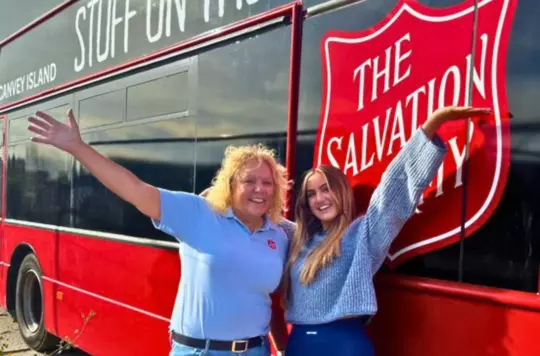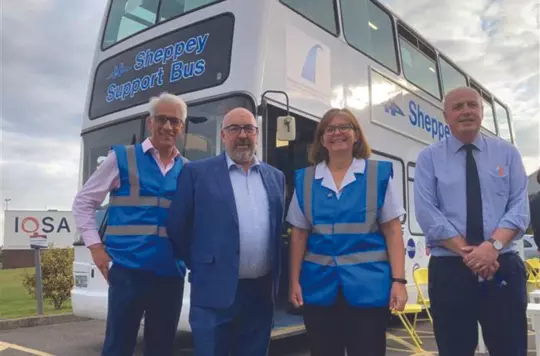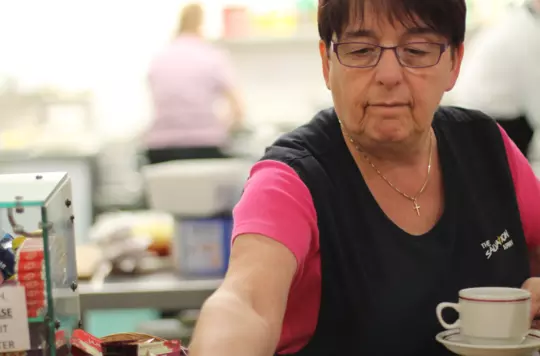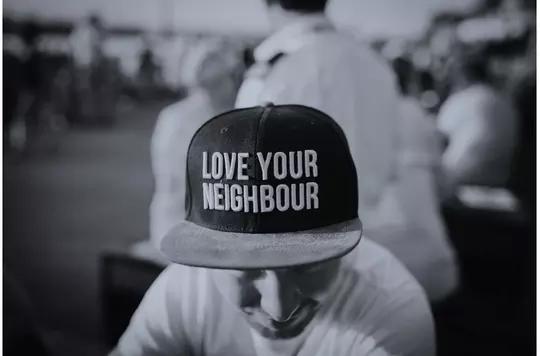18 November 2023
The Victory Programme: A recipe for good
Simon Hope
Simon Hope finds out how corps are cooking up community connections through the Victory Programme.
Someone once said: ‘The way to a disciple’s salvation is through their stomach.’ That someone was me, but food is undoubtedly an effective way of meeting people where they are, particularly when it helps them step closer to physical and spiritual fullness of life.
The Victory Programme is a territorial initiative designed to equip corps to help people strengthen their cooking, budgeting and growing skills. At the same time, the course helps foster deep relationships in the community. A number of programmes are currently active across the territory – including at Blaydon, Austin House Family Centre in Southwick, Goldthorpe, Scarborough, Openshaw and Douglas on the Isle of Man and through the North East Anti-Human Trafficking and Modern Slavery team – with several more about to fire up.
Over six weeks, students learn recipes and abilities that they can take away and use in the rest of their lives. Anyone can take the course, but people who have found it especially helpful have included struggling parents and guardians, people on the edges of homelessness, elderly people at risk of loneliness, ex-offenders and people on probation.
Territorial Community Engagement Lead Michael Alford explains that an impetus for the innovation was the need to better equip some of the people who regularly returned to food banks. However, this isn’t a bolt-on project, and Michael is careful to highlight certain risks:
‘They’re using induction hobs and knives, so we want to have a bit of curation of that. It’s also easy for budgeting advice to fall into debt advice, which is highly regulated. But we can walk people through all that.’
Michael notes that these risks shouldn’t be barriers. A prime example is Lindsey Barker, who has been the Victory Programme co-ordinator at Scarborough Corps since 2021.
‘I’m not a trained chef,’ she admits. ‘I’ve got no cooking qualifications at all, other than I’m a mum and I like to cook.
‘Our Victory Programme looks at low cost, healthy, one-pot meals. We work through a recipe and then look at budgeting. After the six-week course, they graduate. They receive a certificate, a recipe book with everything we’ve cooked together and a gift from us.
‘It’s one way of taking a food bank to another level. We’re absolutely going to give out food, but we’re also going to show you how to cook it.’
The one-pot nature of the meals means that the only necessary appliance is a tabletop stove for each student. While there are plenty of recipes provided in the Victory Programme cookbook, leaders are free to source their own ideas to fit local traditions and palates.
Perhaps unsurprisingly, a favourite recipe among students at Scarborough is the bacon hotpot. While it might look ‘a bit meh’, this cheap and easy meal wins people over with its flavour. That said, Lindsey’s heart is held by a tweaked hunter’s chicken recipe!
As the Victory Programme becomes a growing part of community ministry for corps, how do cooking lessons nurture disciples?
‘The cooking is almost secondary,’ Lindsey explains. ‘It’s a non-threatening way of bringing people together and having conversations, because people open up and share more easily when they’re doing something. At the end of the six weeks, they’ve made friendships they want to keep.
‘I also show them around. It’s important they understand we are a church and I want them to see the building so that, if they decide to come to a Christmas carol service or whatever, it’s not as daunting. It gives us an opening to break down some of the barriers that prevent people from stepping through our doors.’
Corps officer Major Stephen Noble points out that the evangelical nature of the programme isn’t incidental: ‘Post Covid-19, we came together as a leadership team to re-evaluate what God was calling us to be. Lots of discussions boiled down to making disciples.’
The team realised that many of the traditional entry points into the corps – such as a luncheon club or music festival – had closed or become limited. The Victory Programme was a perfect opportunity because it not only made it likely that new people would find the corps but also provided a continual stream of people who were referred to the corps.
‘You look at the early Church,’ Stephen continues. ‘As well as preaching, they supported the community. This is exactly the same.’
Lindsey can certainly attest to growth through the Victory Programme. Over the past couple of years, she has seen between 63 and 75 per cent of students maintain regular contact with the corps after completing the programme.
‘If you’re thinking about entry points to your corps, or what mission will look like over the next 12 months, I’ve seen the fruits of the Victory Programme,’ she asserts. ‘It’s been beyond anything we imagined at the beginning, and it’s an absolute privilege to come alongside people and provide it.’
Appetite to try it?
- Find out about setting up the Victory Programme at your corps by emailing michael.alford@salvationarmy.org.uk.
- Send your Victory Programme stories to salvationist@salvationarmy.org.uk to share them in the magazine.
Written by

Simon Hope
Editorial Assistant
Discover more

George Tanton checks out the growth of social supermarkets.

Major Lynne Clifton tells Melita Day-Lewis about a new mobile supermarket on the Isle of Sheppey.

This iLearn course is designed for those who prepare or serve food and want to protect the public from food hazards and risks.
